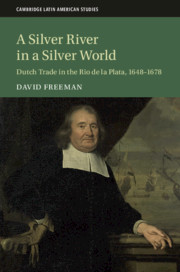Book contents
- A Silver River in a Silver World
- Cambridge Latin American Studies
- A Silver River in a Silver World
- Copyright page
- Dedication
- Contents
- Acknowledgments
- Maps
- Introduction
- 1 The Silver World
- 2 The Silver River
- 3 Golden Connections
- 4 Dutch Ships and Dutch Men on the Río de la Plata
- 5 Conflicting Ownership
- 6 Silver Tongues
- 7 Silver Politics on the Estuary
- 8 The Silver River Runs Dry
- Bibliography
- Index
- Series list continued from page ii
7 - Silver Politics on the Estuary
Published online by Cambridge University Press: 18 April 2020
- A Silver River in a Silver World
- Cambridge Latin American Studies
- A Silver River in a Silver World
- Copyright page
- Dedication
- Contents
- Acknowledgments
- Maps
- Introduction
- 1 The Silver World
- 2 The Silver River
- 3 Golden Connections
- 4 Dutch Ships and Dutch Men on the Río de la Plata
- 5 Conflicting Ownership
- 6 Silver Tongues
- 7 Silver Politics on the Estuary
- 8 The Silver River Runs Dry
- Bibliography
- Index
- Series list continued from page ii
Summary
Upon their return to Spain in 1660, Acarete du Biscay and Ignacio Maleo were summoned to Madrid by the Consejo de Indias to report on the conditions they found in Buenos Aires. Maleo described to the Council what “he had observ’d in the River of Plata, but also [spoke] of the means that might be us’d to hinder Strangers [foreigners] from having the least thoughts of Trading there.” Maleo recommended “keeping Two good Men of War at the Mouth of the River, to dispute and hinder the Passage of such Merchant Ships as should attempt to go up to Buenos Ayres.” He also recommended that two navíos de registro should be sent yearly, “loaded with all things the People of those parts have occasion for. That being sufficiently supply’d, they might have no thoughts of favouring the descent and entrance of Strangers, when they should come thither.” More fundamentally, Maleo “made a proposal of changing the usual Way of carrying Goods, which are sent to Peru, and brought … by the Way of the Gallions; that it might be settled on the River of Plata, from whence, he assur’d ’em, the Carriage of ’em by Land to Peru, would be more conveniently perform’d, and at a cheaper Rate, as well as with less Risque, than any other Way [via Lima and the Pacific Ocean].” Of these suggestions, du Biscay recounted that the Consejo de Indias “relish’d only that of sending to Buenos-Ayres Two Vessels laden with Commodities proper for the Country.”
- Type
- Chapter
- Information
- A Silver River in a Silver WorldDutch Trade in the Rio de la Plata, 1648–1678, pp. 154 - 179Publisher: Cambridge University PressPrint publication year: 2020

